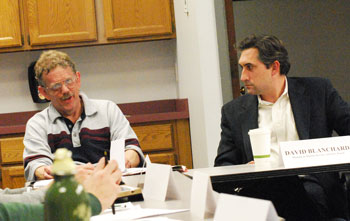The city of Ann Arbor’s living wage ordinance was the topic of a special session of the city’s housing and human services advisory board (HHSAB) held on Dec. 18. The current levels for Ann Arbor’s living wage are $12.17/hour for employers that offer benefits and $13.57/hour for those that don’t. It’s adjusted every year based on federal poverty guidelines.

Left to right: Jim Mogensen addressed the city’s housing and human services advisory board (HHSAB), including board chair David Blanchard, during its Dec. 18, 2012 meeting. (Photos by the writer.)
HHSAB members as a group displayed little enthusiasm for a possible revision to the city’s living wage ordinance – a change that would exempt some nonprofits from compliance. The nonprofits that would not have to pay their workers a living wage are those that provide human services under contract with the city.
However, the group formed a consensus around the idea that their board was, in fact, an appropriate body to review the possible change to the ordinance. Some members felt their attitude toward the possible exemption depended in part on whether they construed the responsibility of the HHSAB narrowly, to focus exclusively on those who receive human services, or broadly, to include humans generally.
The HHSAB review of a possible change to the living wage ordinance will be informed in part by work done by a class of University of Michigan students, to be taught in the winter 2013 term by Ian Robinson, a lecturer in the department of sociology. Robinson attended the Dec. 18 meeting of the HHSAB, and sketched out the range of work he thought his students might be able to do to assist the board. The original timeline for the board to deliver a recommendation to the Ann Arbor city council was mid-February. But it appears now that will be pushed at least to March and possibly April.
The HHSAB is reviewing the living wage ordinance at the direction of the Ann Arbor city council, which had considered an ordinance revision at its Nov. 19, 2012 meeting. The council postponed the matter until mid-February, pending advice from HHSAB.
But discussion of the city’s living wage ordinance had begun at meetings of the HHSAB two months before that. At its Sept. 13 meeting, HHSAB board members were addressed by Joan Doughty, executive director of Community Action Network (CAN), on the topic of the city’s living wage ordinance. She indicated that CAN hired many part-time work/study students for its after-school programs – and her organization had to pay them $13.57 an hour under the city’s living wage ordinance. That detracted from CAN’s ability to pay its full-time staff, who depend on wages paid by CAN to earn a livelihood. HHSAB discussed the idea of forming a subcommittee to study the issue.
City councilmembers Sandi Smith and Jane Lumm, who then served as council liaisons to HHSAB, had introduced a resolution at the council’s Sept. 17, 2012 meeting on the topic. Their resolution would have waived the living wage requirement for those nonprofits that provide human services under contract with the city – which include CAN, although CAN was not mentioned in the resolution or the council’s discussion. That resolution was withdrawn, because it amounted to an ordinance change, which can’t be accomplished with a simple resolution. Councilmembers were told to expect a proposal for an ordinance change in the future.
HHSAB discussed the living wage again at its Oct. 16 meeting, determining that additional study was needed before making a recommendation. But at the city council’s Nov. 8, 2012 meeting, Lumm introduced a resolution to grant a waiver to CAN. Her resolution invoked the ordinance provision that allows the council to grant such a waiver for a specific nonprofit. The council granted the waiver, but on just a 9-2 vote. That relieved some of the immediate pressure – because it meant that CAN could receive its grant under contract with the city. The city had been withholding CAN’s allocation, because CAN could not sign an attestation that it was complying with the living wage ordinance.
So when the city council subsequently considered the proposed change to the living wage ordinance, at its Nov. 19 meeting, it did so without the sense of urgency that came with the earlier context of CAN’s financial difficulties. [.pdf of marked up proposed changes to living wage ordinance] The council’s postponement included a referral to HHSAB for its input.
The well-attended special meeting of HHSAB on Dec. 18 included some who were involved in the push to establish Ann Arbor’s living wage ordinance back in 2001. It was clear from the discussion that the situation of nonprofits that deliver human services had been consciously considered when the local law was first enacted over a decade ago. And because of that previous consideration, it seems unlikely – based on the board’s conversations on Dec. 18 – that HHSAB would make a recommendation in support of an ordinance change. [Full Story]





